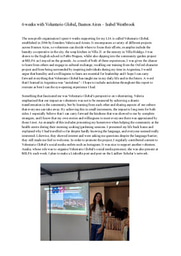Project outline: multilingualism and activism
Climate change and human rights atrocities across the world continue, and activism both now and in the past has played a fundamental role in catalysing change. Before, hearing the word "protest" had often conjured images of being stopped on the motorway so that groups such as Just Stop Oil could make a point. But it's so much more than that. As said by Margaret Mead: “Never doubt that a small group of thoughtful, committed citizens can change the world; indeed, it’s the only thing that ever has.” Critics agree on the significance of activism, arguing that it can change attitudes and behaviours, which often times is the root of an issue. If activism so effectively creates change, what can be done to encourage more people to get involved? What might some people have in common, and if there is anything, how can this be encouraged so that more people are willing? This is what this project, supervised by Dr Yolanda Cerda (Head of the Language Centre at Leeds University), aims to decipher.
Why multilingualism? As inspired by my first year module in Intercultural Competence, I learned not only through the content but from the people I sat with in class how much you can learn through the process of learning a language, including but not limited to gaining a broad world perspective and understanding of other cultures. Through surveys and interviews with people who speak more than one language and activists, I therefore intend to find any link between multilingualism and activism, as I believe that there are similarities between the benefits of multilingualism and factors that encourage activism. If it's true that learning foreign languages enhances an individual's motivation to get involved, this research can support initiatives to place more emphasis on the importance of foreign language teaching in schools or even as extracurricular in universities, in the hopes that this can raise future generations to feel inspired to prevent the issues that we protest against now.
My research shall consist of three stages: Completing the ethical review and compiling a literature review (which has included defining the terms "multilingual" and "global social action"), conducting primary research, and finally, analysis and writing it up. Any other benefits of knowing multiple languages might also be uncovered, as well as different motivations for participating in activism. Hopefully this research can contribute to conversations of language policies and how activism is a force to be reckoned with. I'm looking forward to the outcome!




Please sign in
If you are a registered user on Laidlaw Scholars Network, please sign in